BLAST FROM THE PAST #3: Weathered
SETH GREEN: Hey, you guys hear that? It sounds like Creed!
DAX SHEPARD: I never thought I’d be so happy to hear anything that sounds like Creed!
— Without A Paddle
Ah, Creed. How I remember the halcyon days of 2000 when their songs were played on the radio every ten minutes and on TRL every day after school between Britney Spears and the Backstreet Boys. And how the “Pearl Jam rip-off” criticism was so prevalent that Y-100 actually held a contest where they played a song by either Creed or Pearl Jam and you could win a prize if you called the station and correctly identified the performer. I also remember how Scott Stapp wrote songs about God, kind of looked like Jesus, and struck so many poses WITH AHHRMS WAAAHDE OHH-PUN that the only way the Christ allusions could be any more obvious would have been to shoot a video at Golgotha (although they did shoot the “Don’t Stop Dancing” video in a church)… while simultaneously proclaiming that no, they were not a Christian rock band, and where in the world could you ever get that idea?
(Two videos, people. I got these images from TWO VIDEOS.)
I also remember having two of their albums. Human Clay was a burned copy and I remember listening to it once, being bored with it unless the singles were playing (now where have I made that biting criticism before?), and never really bothering with it again. I vaguely recall the non-singles often being kind of slow-paced and sometimes overlong, though never as egregiously overlong as the last album I reviewed for this feature. For all I know I could be completely wrong about this. But even now that I’m going back and revisiting all these old albums, I still feel no urge to dig up Human Clay and listen to it again.
Weathered, on the other hand… well, that was a completely different story.
For the first time in the brief history of BLAST FROM THE PAST, I’m taking a look at an album that once upon a time I loved. I quickly got tired of Silver Side Up and Be Here Now simply demanded too much patience and attention in the pre-iPod era, but I used to listen to Weathered all the time. I remember marveling at Mark Tremonti’s shredding in “Stand Here With Me” and how I thought the riff in “Signs” was pretty much the heaviest thing ever, and “My Sacrifice”? That was my jam, man!
Hell, I even thought the album art was kind of cool in a mystical new-age fantasy wasteland kind of way. And I mean the artwork in the liner notes, not the album cover, which depicts a mysterious hand carving Photoshopped likenesses of the band into a tree. So I just looked through the artwork again… and good Lord, nearly all of it is hideous. What was I thinking back then?
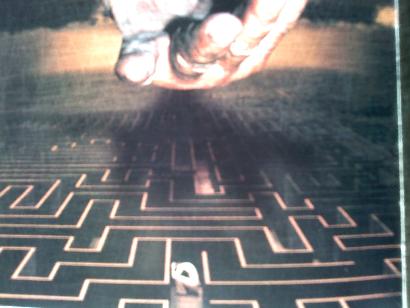
The hand of God tries to help the guy from the "My Own Prison" cover navigate the labyrinth of life.
So why did this album end up buried toward the bottom of my CD tower in my bedroom? I can’t really explain why. I guess I just wanted to listen to something else for a change – I listened to this album so much during high school that I still remembered pretty clearly what most of these songs sounded like even though I hadn’t heard them in years. As I began moving on to other music, I never really felt the urge to give Weathered another spin. I had started to realize just how vast the musical landscape was, that I had barely even begun to explore it, and that the Internet was actually a pretty handy tool for helping me find new stuff to listen to. And so what was once the soundtrack to many a 7th-period study hall where I had nothing else to do was left to collect dust in my room as my musical taste continued to evolve.
And now that I’ve given it some spins, it’s time to see how well Weathered holds up. I’d make a joke about whether or not my opinion of this album has eroded over time, but I like to think I’m above such obvious puns.
THE ALBUM REVISITED
Weathered kicks off with the fittingly titled “Bullets,” an opening salvo directed at those who would criticize Creed or try to belittle their success. Modern pop musicians have fondly christened such people “haters.” Scott Stapp of course never refers to them by this name – come to think of it, the word probably didn’t even exist yet in 2001 – but it’s pretty clear that this is what “Bullets” is about. “I laugh aloud ‘cause my life/Has gotten inside/Someone else’s mind,” he says, making a simple sentiment like “You hate me, yet you can’t stop thinking about me” sound like the plot of an upcoming Wachowski brothers movie. “How do we know that any of this is real, Neo? What if our lives only actually exist inside someone else’s mind? What if the world as we know it… is fiction?” These mind-blowing philosophical questions – along with a 10-minute death scene for Carrie-Anne Moss (spoiler alert!) – coming this summer to a theater near you!
Stapp considers his critics “thorns in [his] side” who “mindless[ly] clutter [his] path” because they want what he has; in his mind these people are cowards who don’t have the nerve to talk shit about his band to his face. But why would they? Scott Stapp, after all, is the guy who once drunkenly challenged 311 to a fight pretty much on a whim, as far as I can remember. I know this because he hilariously announced his intentions by declaring, and I quote, “311, I am ready to fight.”
“Bullets” is about as heavy as this album gets. Unfortunately the band is so busy taking shots at all their critics (and Creed had – and still has – a lot of critics) that they forgot to write a memorable song. There are pieces of a decent song here; the introductory buildup to the main riff is okay, and the bridge is easily the catchiest part of the song (I’ll just ignore this last part: “Please help me find a place/Somewhere far away/Yes, I’ll go and you’ll never see me again” – isn’t that what the haters want?). The main riff sounds like it should be leading into a stronger riff, and the chorus (“LOOK AT MAYYYY-UH!/LOOK AT MAYYYY-UH!/At LEAST look at ME when you SHOOT a bul-LET through my HEAAAAAD/Through my HEAAAAAD/Through my HEAAAAAAAAAAD!”) suffers from something I’ve dubbed “Beyonce Syndrome” – where a song has an un-catchy chorus that sounds like it was supposed to lead into a much catchier chorus that never actually comes. And yet the song was released as a single anyway. Is it any wonder that “My Sacrifice” and “One Last Breath” soared to the top of the charts, yet this song never caught on? I would have chosen “Stand Here With Me,” personally.
The aggression continues even further on the second track, “Freedom Fighter,” where Stapp casts himself as the titular tough guy “raging on in holy war.” And the fact that he talks about a “holy war” in a song released two months after Al-Qaeda began its own holy war against the United States seems… interesting, to say the least. I’m sure Stapp hadn’t intended his lyrics to be taken that way, but listening to it now I can’t help but think about that context.
Obviously he isn’t writing from the perspective of the jihadists – we’re talking about a guy who struck so many Jesus poses that he had to keep denying that Creed was a Christian band, after all. And nobody would have the balls to write a song from that point of view so soon after 9/11. I’m not even sure if Seth Putnam has gone that far, and that guy’s written songs called “Hitler Was A Sensitive Man,” “I Became A Counselor So I Could Tell Rape Victims They Asked For It,” and “I Sent Concentration Camp Footage To America’s Funniest Home Videos.” So what “holy war” is being waged here? Is Scott Stapp trying to lead the Fourth Crusade? King Richard’s a pretty tough act to follow, buddy.
Now we come to track 3, “Who’s Got My Back,” and I would like to very briefly discuss some criticism I remember reading about this album when it came out. Before I actually got my copy of Weathered, I read a C-minus review of it in Entertainment Weekly that poked fun at the huge statements the band tries to make on it. Essentially the critic’s opinion was that this is an incredibly pretentious and self-important album. And there is no song on this album – or possibly even in Creed’s entire career – that probably deserves such labels more than this one.
“Who’s Got My Back” is an eight-and-a-half-minute opus bookended by a Cherokee Indian prayer and stuffed with ominous keyboard drones, epic string sections, and oh yeah… lyrics about how the human race has broken its covenant with God and is now left to fend for itself in the universe, leading Scott Stapp to ponder the titular question. It’s like something straight out of Spinal Tap’s “serious artist” phase, only played totally straight.
In the immortal words of Keanu Reeves, “Whoa.” I mean, if you’re going to tackle that heavy a subject in your lyrics, it’s really hard to not come across as preachy and at least somewhat pretentious. Especially when you choose to tell your audience that the covenant has been broken by mankind by outright saying, “See the signs/The covenant has been broken/By mankind.” When William Butler Yeats wrote “The Second Coming,” a poem in which he foresees the violent downfall of Christianity and its eventual replacement by a new and unknown philosophy, he used images and symbolism to get his point across. He didn’t just come right out and say, “We’re losing all that is sacred to us! Our faith is in danger!” And I realize it’s stupid to compare rock lyrics to one of the greatest poets of the 20th century, but my point is… when you’re writing a song about mankind breaking its covenant with God, you should probably step your lyrical game up a notch or two, you know?
Next up is “Signs,” which is a pretty unique song because it’s the only song I can think of that seems to be about what it isn’t about. The verses inform us that “this is not about age/God/race/sex” and it’s all very meta, but then Stapp starts shouting about seeing the signs in a way that sounds like one hilariously grammatically incorrect run-on sentence: “Can’t you see them see the signs we see them all the signs you see them!”
Um… no? What signs am I supposed to be looking for? There is no indication anywhere else in these lyrics that I should be seeing them. There are no hints anywhere about what they could possibly mean. Are these the same signs from “Who’s Got My Back”? The ones telling us how mankind has broken their covenant with God? No, that can’t be it – Scott Stapp just spent eight and a half minutes telling me about those signs in the last song, so that would be kind of redundant. Clearly these must be a different set of signs. But for all I know he could be talking about street signs and admonishing me for being a bad driver and not noticing them. Give me a break, Scott! Ninety-nine times out of a hundred I notice that DO NOT ENTER sign, and the one time I miss it and go the wrong way on a one-way street you’re yelling at me about how I need to see the signs.
“One Last Breath” and “My Sacrifice,” the two massively popular singles from this album that were so overplayed that you’re probably hearing them in your head as you read this, signify the album arriving at its strongest section, which ends with “Hide” at track 9. I say this is the strong section because it’s where you hear all the most memorable hooks and best guitar work that Weathered has to offer. “My Sacrifice” is the only song in this stretch that doesn’t feature a melodic guitar line in the verses, but it’s probably the catchiest track on the album. If you want to hear Creed at their best (assuming you want to hear them at all), these five songs might be a good place to start.
And yet… there’s a problem here that I never really noticed before. If the earlier songs are most noticeably flawed because they try addressing themes that the lyrics simply aren’t strong enough to explore, these songs make the listener notice a certain disconnect between the lyrics and music. “One Last Breath” is a song about dying, presumably before you think you’re ready to go, and trying to accept it anyway. The chorus goes like this: “Hold me now/I’m six feet from the edge and I’m thinking/Maybe six feet ain’t so far down.” The first time we hear this chorus, it comes complete with a melancholy cello playing in the background to really drive the sadness home. Hell, when I first heard “One Last Breath” back in the day I thought it was about a man contemplating suicide. Yet each subsequent chorus is performed with all the triumphant vigor of “My Sacrifice” and “Stand Here With Me,” the two happiest-sounding songs here (especially lyrically).
There are all kinds of contradictions going on here. The first four songs are pissed off and preachy, filled with attacks on enemies and warnings about being abandoned by God, while the album’s second half tries to be more uplifting and closes by telling us to “just give love to all.” Then comes “One Last Breath” (#5), a song about death that seems like it can’t decide whether it’s about fearing death or accepting it. “My Sacrifice” (#6) and “Stand Here With Me” (#7) celebrate undying friendship and loyalty; “Weathered” (#8) is about being old and broken and completely isolated from the world. (Or at least until you get to the part where our “rusted and weathered” narrator inspires himself to soldier on with lyrics that almost sound like they belonged in “Bullets” – “Believe what you will/That is your right/But I choose to win/I choose to fight!”) In “Hide” (#9) Stapp tells us that “dancing with the devil” has been “making [him] grow old” and warns us, “Divided is the one who dances/For the soul is so exposed”; the very next song is naturally called “Don’t Stop Dancing.”
Thanks to these contradictions, the arrangement of the songs on Weathered almost makes them feel out of order. “Signs” warns us about something bad happening after it’s already happened in “Who’s Got My Back.” Songs about friendship are immediately followed by songs about alienation. A song about death is stuck right in the middle of the album; unless the following songs are meant to be set in the afterlife and God is that great friend Stapp addresses in “My Sacrifice” and “Stand Here With Me” (having been reunited in heaven and whatnot), it doesn’t seem to make much sense.
Musically, big triumphant stadium rockers are Creed’s modus operandi no matter what the songs are about. Scott Stapp’s delivery of lyrics about great and fulfilling friendships that make you a better person (“Stand Here With Me”) no matter how long it’s been since you last saw each other (“My Sacrifice”) is the same kind of singing he uses to tell us all that he’s “raging on in holy war.” Every song is played at around the same mid-range tempo. And guitarist Mark Tremonti, who also played bass on this album after original bassist Brian Marshall left the band, isn’t reluctant to sprinkle in some clean tones here and there (the verse melody he plays in “Hide” is perhaps my favorite guitar part on the whole album), but he still uses pretty much the same heavy overdrive tone in every song. It isn’t quite as monotonous here as it is with certain other bands, though this is thanks mainly to Tremonti’s technical skill.
The only song here that doesn’t fit the “epic rocker” bill is the closer, a soft acoustic ballad called “Lullaby.” That label applies to literally everything else on this album though. Even songs like “Hide” and “Don’t Stop Dancing” that don’t sound like big epic Creed songs at first become big epic Creed songs eventually because I guess the band just couldn’t help themselves. After a while all the massive sound and grandiose statements get kind of tedious and there’s little to no relief from any of it. Sometimes you just need to tone things down a notch and give the listener a little break – or at the very least show that you can write more than one type of song. Oh, and try not to write any eight-and-a-half-minute epics about humanity being abandoned by God.
High Points: Like I said before, tracks 5-9 (“One Last Breath,” “My Sacrifice,” “Stand Here With Me,” “Weathered,” and “Hide”) make up the strongest section of this album, especially if you can get past the lyrical issues (“Run in fields of time”? Huh?).
Low Points: The first four tracks, but especially “Bullets” and “Who’s Got My Back.”
WHERE ARE THEY NOW?
Three years after Weathered came out (and topped the Billboard charts for eight consecutive weeks), Creed broke up – but not before becoming perhaps the first and possibly only band ever to be sued by its own fans for putting on a disastrously awful show. Scott Stapp tried his hand at a solo career; his debut The Great Divide was released in 2005, went platinum within a month, and was then pretty much forgotten about. A second solo album – this one a double album called Between Lust and Love – is scheduled for release later this year. The rest of the band recruited singer/guitarist Myles Kennedy and adopted the name Alter Bridge; that band has put out three albums to date.
In the years following the release of Weathered, Stapp had developed an alcohol addiction that damaged his relationship with the rest of the band. Aside from fighting 311 and that infamous lawsuit-inspiring concert, where a drunken Stapp didn’t sing any lyrics and appeared to pass out onstage, Rolling Stone reported that he’d briefly considered suicide after drinking a bottle of whiskey. After Creed’s breakup in 2004, he devoted himself to cleaning up his act and beating his addiction. His former bandmates, impressed by how he’d turned everything around, agreed to give Creed another go. Their reunion album Full Circle came out in 2009.
I’m going to be perfectly honest – I never understood why Creed got so much hate from the critics back when they were popular. And while I do understand that position better now, I still think there are plenty of other bands that were and are more deserving of scorn. Creed was popular at around the same time as Limp Bizkit and Crazy Town and a bunch of other obnoxious rap-metal bands (some of which I used to like), and they broke up just as the Good Charlottes and Simple Plans of the world began rising to prominence.
You thought Creed’s songs about God were annoying? Simple Plan has a song called “God Must Hate Me” in which the singer, a whiny-voiced 20-something speaking from the perspective of an even whinier teenager, becomes convinced that God hates him because he snuck out one night, crashed his dad’s car, and forgot to study for a test. I know teenagers have a knack for exaggerating their problems – I’m as guilty of that as any other kid – but to actually hear someone singing a song like that really grates on my nerves. As far as that guy is concerned, nothing is ever his fault. He’s always the innocent victim. And that’s not the only song of theirs to express that same sentiment. Then again, Simple Plan didn’t get played every ten minutes on the radio. And none of those other bands, except maybe Limp Bizkit, were ever nearly as big as Creed.
Creed was one of those bands that could have been better received if they’d had a different frontman. All the biggest complaints always centered on Stapp’s often overwrought lyrics and Vedderesque singing, along with the apparent messiah complex he displayed in their videos. Well, that and the arena/radio-friendly hard-rock sound that was later adopted and popularized even further by bands like Nickelback, Theory Of A Deadman, Three Days Grace, and tons of others that are all over rock radio these days. And the fact that the band always seemed to be super-serious about absolutely everything all the time and never displayed much of a sense of fun or humor.
Okay, so maybe there are plenty of reasons to hate Creed. But I just can’t really bring myself to do that. Is it because I like Tremonti’s guitar work too much? Do I simply have a higher tolerance for their music? Or could it be because I listened to Weathered so much during high school that I’ll probably always hear it through some kind of nostalgia filter? I don’t know. I used to love this album back then. Now I’m just indifferent to it.



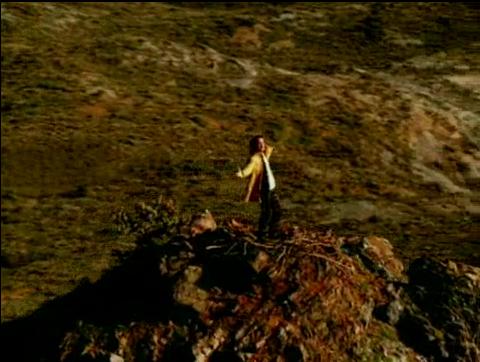

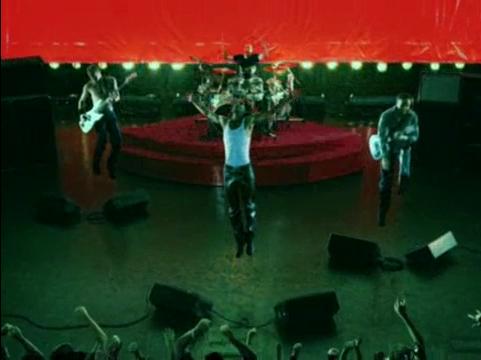
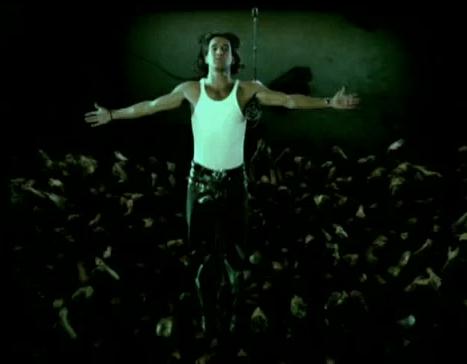
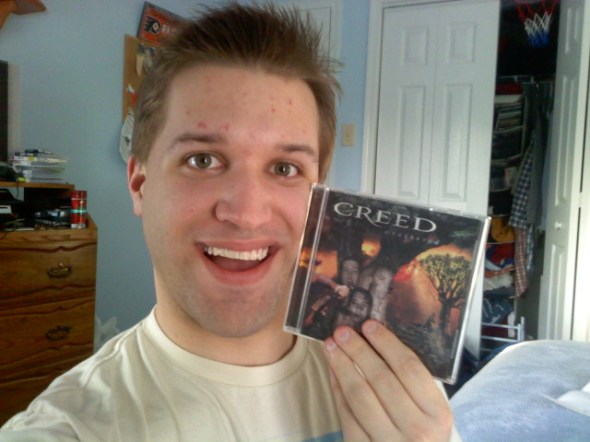

Leave a comment